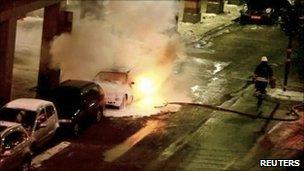Sweden has 200 violent Islamists, security service says
- Published

Officials believe the Stockholm bomber intended to kill "as many people as possible"
A report by Sweden's Security Service says about 200 people in the country are involved in Islamist extremist networks which promote violence.
They present a threat to "groups and individuals" but not to the government or other key institutions, it adds.
The report - requested by the government in February - was published on Wednesday, four days after a suicide bomber injured two people in Stockholm.
Officials say they are 98% sure he was Iraq-born Taimour Abdulwahab al-Abdaly.
Abdaly, who grew up in Sweden and had been living in the UK, owned a car that exploded on a busy shopping street in the Swedish capital, shortly before the blast nearby which killed the bomber.
Officials believe the bomber intended to kill "as many people as possible", possibly at the central train station or a popular department store.
An audio recording apparently made by Abdaly said he could not sit and watch while Muslims in Europe were oppressed.
'Preventative measures'
On Thursday, the Security Service (Saepo) said it had been asked by the government earlier this year to put together a report on Islamist extremist networks in Sweden, and strategies for reducing radicalisation.
According to a , those active in Sweden focus mostly on "action and propaganda against foreign troops in Muslim countries, and against governments they see as corrupt and not representing what the networks consider to be the only true interpretation of Islam".
"Individuals active in these networks engage in activities aiming to support and facilitate terrorist offences mainly in other countries."
The report concludes that there is "currently not a threat to the fundamental structures of society, Sweden's democratic system or central government", but warns that individuals and groups may be at risk.
"Only a relatively limited number of people are involved in violence-promoting Islamist extremism, and the group of active members on whose actions the descriptions in this report are based consists of just under 200 individuals."
"There is nothing to indicate that the number of people radicalised in Sweden is growing."
Islamist extremism and radicalisation should be countered mainly by an "increasing focus on preventive measures", the report recommends.
The Swedish authorities have said Abdaly was completely unknown to the security services before the blasts, but pointed out that he had been living with his wife and children in the British town of Luton.
He was thrown out of a mosque there because of his extremist views.
- Published15 December 2010
- Published13 December 2010
- Published13 December 2010
- Published13 December 2010
- Published13 December 2010
- Published12 December 2010